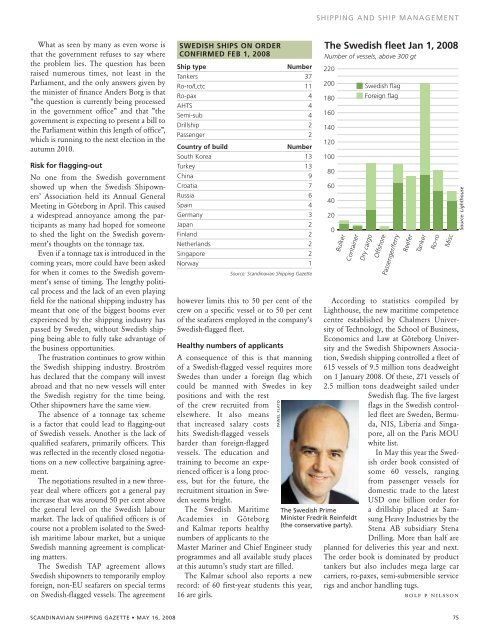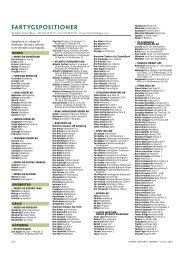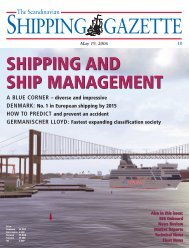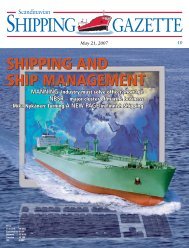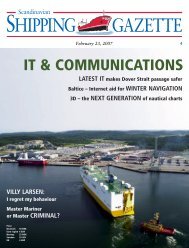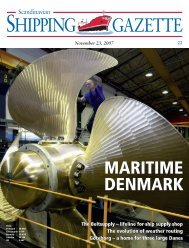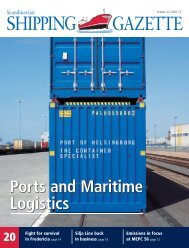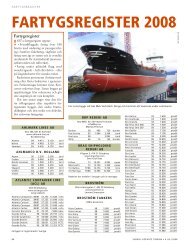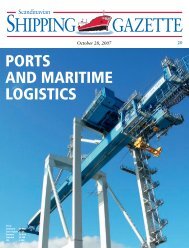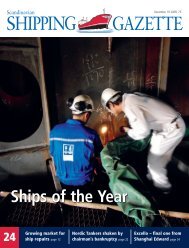SSG No 10 - Shipgaz
SSG No 10 - Shipgaz
SSG No 10 - Shipgaz
- TAGS
- shipgaz
- shipgaz.com
You also want an ePaper? Increase the reach of your titles
YUMPU automatically turns print PDFs into web optimized ePapers that Google loves.
What as seen by many as even worse is<br />
that the government refuses to say where<br />
the problem lies. The question has been<br />
raised numerous times, not least in the<br />
Parliament, and the only answers given by<br />
the minister of finance Anders Borg is that<br />
”the question is currently being processed<br />
in the government office” and that ”the<br />
government is expecting to present a bill to<br />
the Parliament within this length of office”,<br />
which is running to the next election in the<br />
autumn 20<strong>10</strong>.<br />
risk for flagging-out<br />
<strong>No</strong> one from the Swedish government<br />
showed up when the Swedish Shipowners’<br />
Association held its Annual General<br />
Meeting in Göteborg in April. This caused<br />
a widespread annoyance among the participants<br />
as many had hoped for someone<br />
to shed the light on the Swedish government’s<br />
thoughts on the tonnage tax.<br />
Even if a tonnage tax is introduced in the<br />
coming years, more could have been asked<br />
for when it comes to the Swedish government’s<br />
sense of timing. The lengthy political<br />
process and the lack of an even playing<br />
field for the national shipping industry has<br />
meant that one of the biggest booms ever<br />
experienced by the shipping industry has<br />
passed by Sweden, without Swedish shipping<br />
being able to fully take advantage of<br />
the business opportunities.<br />
The frustration continues to grow within<br />
the Swedish shipping industry. Broström<br />
has declared that the company will invest<br />
abroad and that no new vessels will enter<br />
the Swedish registry for the time being.<br />
Other shipowners have the same view.<br />
The absence of a tonnage tax scheme<br />
is a factor that could lead to flagging-out<br />
of Swedish vessels. Another is the lack of<br />
qualified seafarers, primarily officers. This<br />
was reflected in the recently closed negotiations<br />
on a new collective bargaining agreement.<br />
The negotiations resulted in a new threeyear<br />
deal where officers got a general pay<br />
increase that was around 50 per cent above<br />
the general level on the Swedish labour<br />
market. The lack of qualified officers is of<br />
course not a problem isolated to the Swedish<br />
maritime labour market, but a unique<br />
Swedish manning agreement is complicating<br />
matters.<br />
The Swedish TAP agreement allows<br />
Swedish shipowners to temporarily employ<br />
foreign, non-EU seafarers on special terms<br />
on Swedish-flagged vessels. The agreement<br />
SwediSh ShipS On Order<br />
COnFirMed FeB 1, 2008<br />
Ship type number<br />
Tankers 37<br />
Ro-ro/Lctc 11<br />
Ro-pax 4<br />
AhTS 4<br />
Semi-sub 4<br />
Drillship 2<br />
Passenger 2<br />
Country of build number<br />
South Korea 13<br />
Turkey 13<br />
China 9<br />
Croatia 7<br />
Russia 6<br />
Spain 4<br />
Germany 3<br />
Japan 2<br />
Finland 2<br />
Netherlands 2<br />
Singapore 2<br />
<strong>No</strong>rway 1<br />
Source: Scandinavian Shipping Gazette<br />
however limits this to 50 per cent of the<br />
crew on a specific vessel or to 50 per cent<br />
of the seafarers employed in the company’s<br />
Swedish-flagged fleet.<br />
healthy numbers of applicants<br />
A consequence of this is that manning<br />
of a Swedish-flagged vessel requires more<br />
Swedes than under a foreign flag which<br />
could be manned with Swedes in key<br />
positions and with the rest<br />
of the crew recruited from<br />
elsewhere. It also means<br />
that increased salary costs<br />
hits Swedish-flagged vessels<br />
harder than foreign-flagged<br />
vessels. The education and<br />
training to become an experienced<br />
officer is a long process,<br />
but for the future, the<br />
recruitment situation in Sweden<br />
seems bright.<br />
The Swedish Maritime<br />
Academies in Göteborg<br />
and Kalmar reports healthy<br />
numbers of applicants to the<br />
Master Mariner and Chief Engineer study<br />
programmes and all available study places<br />
at this autumn’s study start are filled.<br />
The Kalmar school also reports a new<br />
record: of 60 first-year students this year,<br />
16 are girls.<br />
According to statistics compiled by<br />
Lighthouse, the new maritime competence<br />
centre established by Chalmers University<br />
of Technology, the School of Business,<br />
Economics and Law at Göteborg University<br />
and the Swedish Shipowners Association,<br />
Swedish shipping controlled a fleet of<br />
615 vessels of 9.5 million tons deadweight<br />
on 1 January 2008. Of these, 271 vessels of<br />
2.5 million tons deadweight sailed under<br />
Swedish flag. The five largest<br />
flags in the Swedish controlled<br />
fleet are Sweden, Bermuda,<br />
NIS, Liberia and Singapore,<br />
all on the Paris MOU<br />
white list.<br />
In May this year the Swedish<br />
order book consisted of<br />
some 60 vessels, ranging<br />
from passenger vessels for<br />
domestic trade to the latest<br />
USD one billion order for<br />
a drillship placed at Samsung<br />
Heavy Industries by the<br />
Stena AB subsidiary Stena<br />
Drilling. More than half are<br />
planned for deliveries this year and next.<br />
The order book is dominated by product<br />
tankers but also includes mega large car<br />
carriers, ro-paxes, semi-submersible service<br />
rigs and anchor handling tugs.<br />
rolf p nilsson<br />
SCANDINAVIAN SHIPPING GAZETTE • MAY 16, 2008 75<br />
pawel flato<br />
SHIPPING AND SHIP MANAGEMENT<br />
220<br />
200<br />
180<br />
160<br />
140<br />
120<br />
<strong>10</strong>0<br />
80<br />
60<br />
40<br />
20<br />
0<br />
Bulker<br />
Container<br />
The Swedish Prime<br />
Minister Fredrik Reinfeldt<br />
(the conservative party).<br />
The Swedish fleet Jan 1, 2008<br />
Number of vessels, above 300 gt<br />
� Swedish flag<br />
� Foreign flag<br />
Dry cargo<br />
Offshore<br />
Passenger/ferry<br />
Reefer<br />
Tanker<br />
Ro-ro<br />
Misc<br />
Source: Lighthouse<br />
F<br />
S


